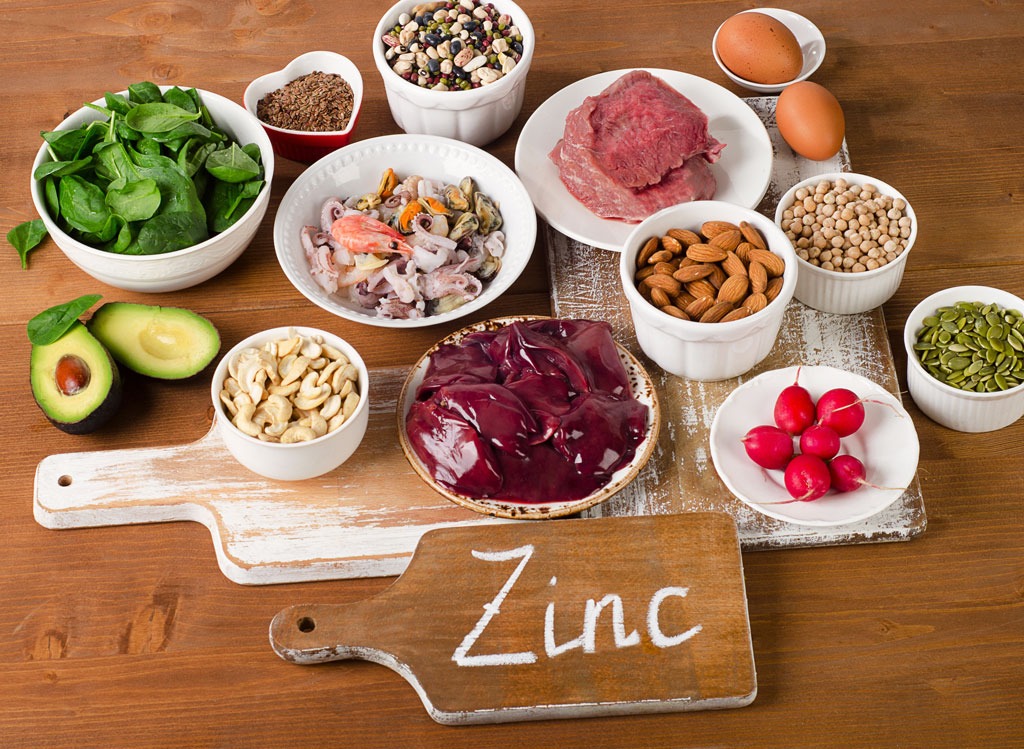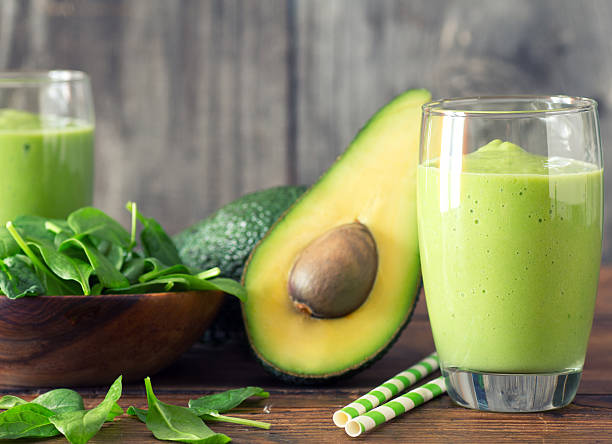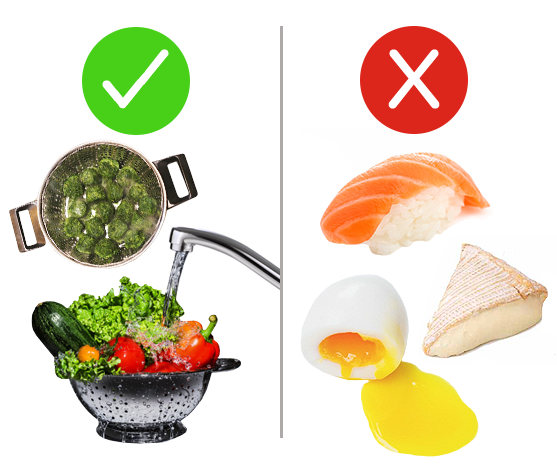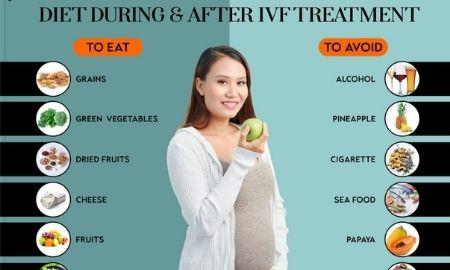In vitro fertilisation, or IVF, is a treatment that requires careful preplanning. Prepare your body for the process, both mentally and physically. Although there is no defined fertility diet, you may prepare your body to accept the treatment and effectively raise your chances of success. Consider that you’re preparing to get pregnant, and your health would impact the embryo.
Several medical procedures are required during IVF treatment, and you must be in good health to do so. An unhealthful physical state, stress, or insufficiency may reduce the success rate of IVF. So, before starting treatment, you should create a healthy lifestyle habit. If you have any other health problems, including thyroid, fibroids, PCOS or any other chronic condition, you must always consult a doctor.
Diet is as important as ever for couples undertaking the IVF journey. The foods you eat provide a nutritional base for your body systems.
Your nutrition influences workout result, hormone balance, sperm production, egg count, uterus inner layer quality, and other fertility-related procedures. As a result, it comes down to the fact that your diet will perform a vital role in the success of your IVF treatment from the beginning.
It is recommended that women undergoing fertility treatment maintain a constant, healthy lifestyle. During this period, it is not necessary to be completely quiet. During the early stages of treatment, women must regularly participate in light physical exercises. It is beneficial because such practices promote metabolism and improve overall health. Swimming and walking are two moderate activities that help in regulating insulin secretion and boosting hormone levels. It has a substantial impact on enhancing fertility.
Making a Healthy Balanced Diet Food List
Because everyone has a different body type, no diet is suitable for everyone. However, adopting a diet plan is a good idea. The diet plan will contain foods based on research that has revealed which foods are helpful and which should be avoided during the IVF procedure.
Eating healthy is a way of providing your body with the micronutrients it needs daily. It is vital to monitor your calories and eat a healthy balanced diet. Therefore, make two lists: what to eat and what not to eat, then keep both lists next to you as a recall. So that you can track your calories with a smartphone app, monitoring your nutrition will enable you to see what is and is not working for you, and meanwhile, you can make changes in diet and determine the best diet for IVF success for yourself.
Foods to Consume During Getting IVF Treatment
Doctors won’t necessarily give you a list of foods to eat or avoid during IVF implantation or at any other stage of the treatment. Still, with a basic understanding of the process, you can do a few factors to help your body respond better. You may also go for a food intolerance test so that you do not suffer any food allergies. The list of nutrients needed for a successful IVF treatment is given below:-
- Foods High in Zinc

Zinc helps with hormonal balance. Optimal hormone levels that effectively control the entire activity are essential parts of reproduction. Any variations in your hormone levels could cause your ovaries to malfunction or prohibit eggs from being produced correctly. As a result, ensuring that you achieve your daily zinc requirement of around 15mg without fail can be helpful during IVF. This can be achieved by taking zinc supplements, but the best alternative is to eat zinc-rich foods, including milk, grains, potatoes, nuts, and a few slices of meat.
- Fat and protein
Despite popular belief, fats are not harmful to your health; you have to know which types of fat to consume. Fat-containing junk food should be avoided where possible. It is strongly recommended to choose healthy fatty acids and unsaturated fats as they provide your body with energy reserves that it can take on at any time. Healthy fats are also essential for collapsing nutritional components in food and enabling your body to absorb them. They can be discovered in walnuts, olive oil, Corn, flaxseed oil, coconut, avocados, and many other foods.
- Vitamin B (Folic Acid-Rich Foods)

Folic acid is essential during pregnancy and even before it. Even during the Ivf cycle, folic acid is required to ensure that the embryo that forms is healthy and free of developmental disorders. Folic acid may be found in various foods, and including it in your diet is simple and effective. Foods high in folic acid include green beans, spinach, broccoli, kiwi, poultry products, etc.
- Foods with Carbohydrate
Carbohydrates are an excellent source of energy for the body. Carbohydrates are classified into two types: simple carbohydrates and complex carbohydrates. Simple carbohydrates involve fruits, white sugar and so on, whereas complex carbohydrates contain vegetables and whole grains. Complex carbohydrates are beneficial, but simple carbohydrates, apart from fruits, should be avoided. Avoid refined carbohydrates, including white flour, cakes, white bread, and pasta. Choose whole-grain bread, brown rice, whole grain cereals, etc.
- Consume Avocados

Avocados have long been considered beneficial for pregnant women, and they are also helpful to women undergoing IVF treatments. It is said that the existence of monosaturated fats, which avocados are high in, is beneficial to the IVF process. Moreover, eating avocados aims to improve the health of a woman’s ovulatory region, increasing the likelihood of a successful IVF by 3.5 times.
- Hydration for the body
With your current lifestyle, you can never drink enough water. We tend to overlook how much water we consume. It is best to follow a timetable of one glass of water every hour, making sure that at least eight drinks of water are consumed. Water levels that are ideal help keep a high balance of different components within the body and aid in the bloodstream. They also aid in the initial stages of implantation. So drink lots of water, plus some extra, including more.
Foods to Avoid During IVF Treatment
- Caffeine and Alcohol

Caffeine and alcohol consumption during pregnancy might cause developmental issues in the foetus. Alcohol is a diuretic, which causes vital nutrients such as zinc and folic acid to be eliminated. Alcohol, excess coffee, smoking, and even chocolates contain caffeine and should be avoided during IVF.
- Raw eggs
Avoid raw eggs at all costs, whether consumed directly or even as part of other preparations such as snack mixture, specific salads, or eggnog. They are likely to have the salmonella virus, which can quickly cause food poisoning.
- Sugar
You are at your healthiest when you follow a sugar-free diet that does not include sugar substitutes. Refined sugar is a villain in this reference, as it has a highly adverse impact on the body. Even a tiny quantity of it causes a rapid surge in blood sugar levels. Sugar can make you feel suitable for a while, but eating it regularly puts a massive strain on the liver, causing it to generate more insulin to combat the rising blood sugar level. In the long term, it can increase the risk of diabetes, which has a clear impact on fertility.
- Seafood

Consumption of raw seafood should also be avoided due to the risk of infection. On the other hand, general seafood should be kept to a minimum because fish contains a lot of mercury, which can harm the foetus and cause birth problems.
- Particular types of cheese
Dairy products are safe to consume; however, some types of cheese contain bacteria that can cause infectious diseases. Soft cheeses like camembert and brie and cheeses with a blue tinge should be avoided at this phase. Milk that has not been boiled should not be consumed.
Complying with a better IVF diet plan can increase your chances of having a successful IVF process. However, a few other methods can help you maintain an ideal state of mind and body, such as massage techniques, mindfulness, or even acupressure. These factors ensure that the procedure produces the best possible outcomes.















